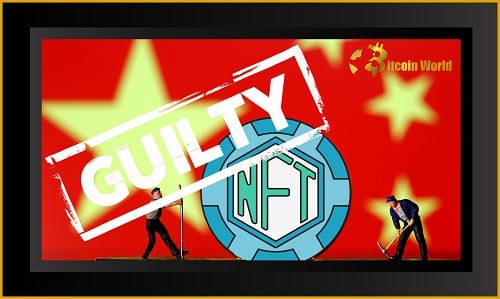In a groundbreaking decision that’s sending ripples through the digital art and crypto world, a Chinese court has ruled against BigVerse, the parent company of NFTCN, a popular NFT marketplace. The verdict? BigVerse was held responsible for allowing a user to mint NFTs from stolen artwork. This landmark case in Hangzhou, China, marks the first time a Chinese court has directly addressed NFT art theft, forcing platforms to take responsibility for verifying the legitimacy of the digital assets traded on their platforms.
NFT Art Theft: A Chinese Court Sets a Precedent
According to a report by the South China Morning Post, the Hangzhou court determined that NFTCN failed to ensure the user minting the NFT was the rightful owner of the artwork. This negligence, the court stated, led to the violation of the original owner’s “right to disseminate works through information networks.” The plaintiff in this case was Qice, a corporation based in Shenzhen, which brought the lawsuit against BigVerse.
The Case Unpacked: Cartoon Tiger and Copyright Infringement
So, what exactly happened? Qice alleged that a user on the NFTCN marketplace listed an NFT featuring artwork of a cartoon tiger getting a vaccination – a piece created by artist Ma Qianli. This unauthorized NFT of the cartoon tiger was reportedly sold for $137 by an anonymous user. The court sided with Qice, ordering BigVerse to compensate the company with a fine of $611. Furthermore, to prevent any further circulation of the infringing NFT, the court mandated that it be transferred to an “eater address” – essentially a crypto wallet with no private key, making the NFT permanently inaccessible.
The court’s rationale is particularly noteworthy. It emphasized that NFT marketplaces like BigVerse directly profit from these transactions and, therefore, have a responsibility to regulate user conduct that infringes upon the rights of others. The court even suggested that NFT marketplaces should implement copyright verification tools to scrutinize artwork uploaded by users. This ruling puts the onus squarely on platforms to actively combat NFT theft and ensure the legitimacy of digital assets.
This legal development arrives shortly after WeChat, China’s dominant messaging platform, issued warnings about suspending accounts linked to NFTs. This move by WeChat aimed to curb speculation in the digital asset space, indicating a growing regulatory scrutiny of NFTs in China.
Navigating the NFT Ecosystem in China: A Tightrope Walk?
While China has maintained a strict stance against Bitcoin trading and mining, the NFT digital art market has shown surprising resilience and growth within the country. Here’s a quick look at the current NFT landscape in China:
- Limited Trading: Unlike many global markets, China prohibits the trading and resale of NFTs for speculative purposes.
- Platform Restrictions: Major Chinese tech giants like Alibaba, Tencent, and JD have launched NFT platforms, but these platforms typically operate under restrictions that prevent secondary market trading. Users can purchase and collect NFTs, but reselling them is generally not permitted.
- State-Backed Involvement: Interestingly, China’s state-backed Blockchain Services Network (BSN) has announced plans to launch NFTs. BSN has partnered with Neo to create Jiuquan, a permissionless blockchain, aiming to foster wider NFT adoption within the regulatory framework.
Despite the restrictions, the NFT market in China is evolving. This court ruling against BigVerse signals a significant step towards establishing clear legal boundaries and responsibilities for NFT platforms. It underscores the importance of copyright protection in the burgeoning NFT space and could lead to stricter platform regulations and verification processes in the future.
Key Takeaways from the BigVerse Ruling:
- Platform Accountability: NFT marketplaces in China can be held liable for copyright infringement occurring on their platforms.
- Verification is Crucial: Platforms are expected to implement measures to verify the copyright of NFTs minted and traded.
- Regulatory Scrutiny Intensifies: The Chinese government is increasingly paying attention to the NFT market, emphasizing regulation and control.
- Impact on Market Growth: While regulations might seem restrictive, they could also foster a more sustainable and trustworthy NFT ecosystem in the long run by deterring illicit activities like art theft.
This ruling is a clear signal that the Wild West days of unchecked NFT activity are coming to an end, at least in China. As the NFT market matures globally, expect to see more legal frameworks and precedents being set to address issues like copyright, ownership, and platform responsibility. The BigVerse case serves as a crucial reminder for NFT platforms worldwide to prioritize copyright verification and user accountability to ensure a secure and legitimate digital art market.
Related Reads: Elon Musk, a Dogecoin supporter, has decided not to join the Twitter board of directors
Disclaimer: The information provided is not trading advice, Bitcoinworld.co.in holds no liability for any investments made based on the information provided on this page. We strongly recommend independent research and/or consultation with a qualified professional before making any investment decisions.


